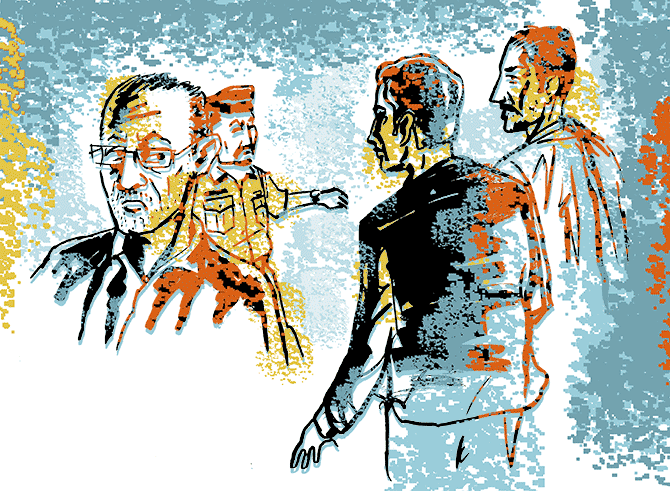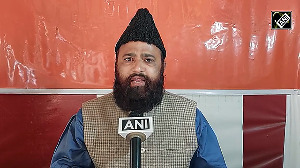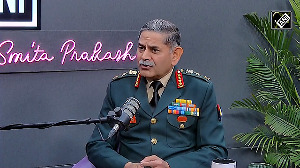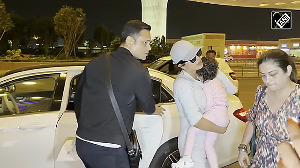'I'm not withdrawing any allegations. I want those CDRs (Peter's call data records).'
'Those are my feelings.'
Savera R Someshwar reports from the Sheena Bora murder trial.
Illustration: Dominic Xavier/Rediff.com

Shyamvar Pinturam Rai may have learnt a new phrase in court on December 14, in what will probably be his penultimate appearance in the Sheena Bora murder trial.
It has been 28 months since he was chased down and arrested by the Mumbai police on Carter Road, a popular hangout spot in north west Mumbai for youngsters, much-in-love couples and home to extremely expensive apartments, and according to the chargesheet, found to possessing a 7.65 bore country-made pistol, three live cartridges and a magazine.
It has been over 19 months since the CBI filed its reply in court, saying it had no objection to Rai turning approver in the case.
Over four-and-a-half months since he first took the stand and, in a chillingly deadpan tone, testified to how a 25-year-old woman had been murdered by her mother and her mother's former husband, assisted by him.
Since he first identified his co-accused, "Woh Indrani Madam hai, unkey baju mein Sanjeev Khanna aur woh Peter Saab (That's Indrani Madam, next to her is Sanjeev Khanna and that is Peter Saab)."
That was also the day his cross examination -- which would span over four months -- began and Rai's first "Yaad nahin (don't remember)" entered the court's records.
Over the months, his answers to the cross-questioning by Sudeep Pasbola, the lawyer for Accused No 1 Indrani Mukerjea, has been well seasoned with "Yaad nahins" and "Maloom nahins (I don't know)" and "Galat hais (It's not correct)" and "Shayads (Maybe)."
On December 14, he had to face, multiple times, Niranjan Mundargi's "Mera yeh kehna hai (It is my contention)", which prefaced many of the questions politely volleyed by the lawyer for Accused No 2 Sanjeev Khanna at the Accused No 3-turned-approver.
It was also a day of drama, light laughter, a careful foundation for a defence, gently phrased judicial advice and a rare reminder that Judge Jayendra Chandrasen Jagdale's genial demeanour could not be taken for granted.
Mundargi's tone is gentler than Pasbola who spearheaded Rai's cross examination.
What Pasbola employed sarcasm, impatience and was at times acerbic, Mundargi chooses affability as he questions "Shyamvarji."
Wednesday, though, that affability was turned down just a notch.
Mundargi begins by gently establishing that, as a driver, Rai did odd jobs and drove Indrani around not only for work but for "shopping and saab kaam ke liye (whenever she needed to go anywhere)."
And that he would wait in, or near the car, when she went shopping, which could last anywhere between "half an hour to 45 minutes."
"It could take longer too," Rai says and agrees that, during such trips, he would wait in or near the car.
Mundargi, even more gently, says the same thing must have happened on April 24, 2012, a few hours before Sheena Bora went missing, when Rai allegedly drove mother, daughter and Sanjeev Khanna to Linking Road, suburban Bandra, north west Mumbai, that, for decades, has drawn bargain-hunting shoppers to its stores, street stalls and walking vendors jostling to make as many sales as possible.
"On April 24, 2012, you said Sheena and Indrani went to Amarsons (a well-known store on Linking Road) and were there for half an hour to 45 minutes," Mundargi says. Sanjeev Khanna and Rai, according to the driver's testimony, waited in the car.
This shopping expedition, according to Rai, was much shorter, "8 to 10 minutes."
"You were waiting in the car with a man you didn't know. Did you speak?" Mundargi wants to know.
Even as Rai says he had been introduced to Khanna by Indrani, Mundargi only wants the answer to his question.
"No."
Mundargi also establishes that while Rai was answering calls and SMSes on his mobile phone, the driver did not see Khanna get or receive a single call or answer a single text message; perhaps to buttress his contention that Khanna was never there.
Rai did not see a mobile phone with Khanna, the driver tells the lawyer.
Mundargi now wants to establish that Rai knows the Bandra area well and that Linking Road is crowded in the evenings, especially at 6 pm when Sheena was allegedly murdered in a bylane near the National College, off Linking Road, in April 2012.
Rai insists he doesn't know the names of the gullies (side lanes) but knows where to go but can't say he knows Bandra that well nor that there were "kafi log (many people)" on Linking Road that fateful evening.
"Kafi nahi, par log the. Rahe honge, rahte hain. (It wasn't too crowded, but there were people around; there generally are)."
This allows him, later, to tell Mundargi he does not know the name of the lane where Sheena Bora was allegedly murdered.
It takes Mundargi over 10 minutes of detailed questioning to establish that there are two ways to get onto S V Road in Bandra once one exited the Worli-Bandra Sea Link and the one that directly took you to S V Road exited near a particularly congested point that saw traffic flow in from east and south Mumbai as well as via the Sea Link.
That this was a vital link in his attempt to establish that it would have been impossible for Khanna -- the father of Vidhie, Indrani's youngest child, adopted by Peter after their marriage -- who had checked into a hotel in Worli, about half an hour away from Bandra if the travel route is not congested, before hiring a taxi to meet his former wife and her daughter was evident in the considerable patient effort he invested in establishing it.
Mumbai's traffic patterns are, among other things, dictated by its largely working population. The traffic towards south Mumbai is congested in the mornings and reverses direction in the evening. There are traffic jams around schools during the times they begin and end for the day as well as during namaaz.
As he did on December 11, landmarks were referenced and crowding patterns discussed with Rai, whom Mundargi once even requested, to many smiles in the courtroom, "Hamari speed se chalo, hum dono jaa rahe hai (in effect, asking him to stay with the question and not race ahead)."
Mundargi then walks a seemingly disinterested Rai through how, a little ahead on the same S V Road, a masjid and the exit from Bandra railway station added to the traffic congestion.
Rai's "Mujhe nahi pata use S V Road bolte hain (I didn't know it was called S V Road" flummoxed Mundargi who turned to Shreyansh Mithare, another lawyer on Khanna's team, to deliver a Pasbola-ish aside, "1998 se gaadi chala raha hai (He has been driving since 1998) and does not know it is called S V Road."
Next, Mundargi want to know about parking.
When Rai says he did not know the name of the lane in which Sheena was allegedly murdered, Mundargi wants to know how close to the wall (it has been established in earlier testimony that the car was parked close to a wall) the vehicle had been parked.
Judge Jagdale is not too keen on walking down this road again -- "Pasbola has it already," he tells Mundargi who requests the court's indulgence.
By now, Rai's complete repertoire, including the rolling of eyes towards the ceiling, long pauses, "Yaad nahis" and "Maloom nahis" are in play; "Galat hai" would make its presence felt soon.
It is established, with Rai gesturing the distance on the railing of the witness box, that the car is parked approximately three feet away from the wall.
Judge Jagdale is amused, if a tad impatient. "No one measures the distance when they park a car."
Mundargi soothingly replies, "I just wanted to find out if there was enough place for anyone sitting on the passenger side to get down."
Ayaz Khan, a lawyer on Indrani's team who specialises in narcotics related cases, interrupts the cross examination.
He wants to consult with Indrani -- or is it Indrani who had been talking to him from the time she reached the courthouse until she had to enter Courtroom 51, who wants to consult with him and is waiting at the entrance of the area demarcated for the accused, her eyes fixed on the judge, ready to step out.
The usually amiable Judge Jagdale is not amused.
"This is very wrong," he chides Khan. "How can you interrupt during the cross? What is going on? Wait for some time, I will give the permission later."
Even as a disappointed Indrani returns to her usual spot at the other end of the enclosure for the accused, Khan -- who has been following the case sitting in the first row -- apologies to the judge.
He soon leaves the court and is not seen for the rest of the session, even when Indrani is herded back to prison.
On the night of April 24, at about 11 pm or 11.30 pm, after Sheena's alleged murder, Rai, as per his earlier testimony, took food from a nearby restaurant and went to Marlow, the building in Worli where the Mukerjeas own a sprawling apartment.
The clean-shaven Mundargi tends to occasionally struggle for the right Hindi word. He now wants to know the lighting arrangement in the Mukerjea flat when Rai went upstairs with the food and saw Mikhail, Sheena's brother and Indrani's only son, drinking the allegedly doctored alcohol.
"Light dim tha?" Then searching for the right word, "Kam tha?."
"Not the area where he was sitting," replies Rai. "The rest of the flat was dimly lit."
"You've already said in your testimony that medicine was mixed in the alcohol. How much was left? How much did he drink?"
Rai, shaking his head, "Woh maine nahi dekha (I didn't see that)."
Did he speak to Mikhail?
"No."
According to Rai's earlier testimony, when they reached Pen, a bike passed them after they had parked.
"Did the biker come from Khopoli or Pen?" Mundargi asks.
"You've not set the background," the judge tells the lawyer. "They have parked the car in so many places."
Mundargi looks puzzled for a nano-second before asking, "May I clarify?"
"No, no," smiles Judge Jagdale and waves his hand. "You go ahead."
"Don't know," Rai replies, "the car was facing Khopoli."
More than 80 per cent of Rai's cross examination has been conducted by Pasbola. Mundargi, who is now cross-examining Rai, and Shrikant Shivade -- who will cross-examine the driver for his client Accused No 4, Peter Mukerjea -- are focusing on certain elements that will aid their respective clients.
Mundargi now wants to know about the petrol pump near Pen near which the car was allegedly parked for a while and from where Rai allegedly brought the petrol that was use to douse the body before setting it on fire.
"How far away from the pump was the car parked?" asks Mundargi.
His eyes almost popping out of their sockets, Rai uses his arms to indicate the length of the courtroom.
"About 30 feet," approximates Judge Jagdale.
Rai had earlier testified that there was a car at the petrol pump. Mundargi wants to know its make and colour.
Rai thinks for a while, then takes refuge in "yaad nahin."
"Other than the car and its occupants, how many people were there at the petrol pump?" Mundargi wants to know.
"Don't know," shrugs Rai.
"There must have been a few employees working at the petrol pump," prods Mundargi, preparing for another layer in his client's defence.
Despite the prodding, Rai says he can't remember.
Rai, who has had Skype sessions with Indrani, has testified he is not familiar with social media.
Now, Mundargi wants to know how familiar he is with WhatsApp and Facebook.
Rai manages to look lost for a while before finally admitting he has a Facebook account that he operated with the help of friends.
Mundargi then wants to know if Rai had posted a picture of himself posing with "bade birds, bade pancchi."
Everyone is smiling including CBI Prosecutor Bharat Badami who says it may be easier of Mundargi names the birds.
"Arre... he is not understanding birds, so what will be understand if I give the specific name?" Mundargi tells Badami. "Macaws."
He looks at the judge. "I want to show that he is not conveying the true facts."
Then, he asks Rai about the photograph with the birds again.
"Liya hoga," says Rai
"4, 5 big birds," prods Mundargi.
"Nikala hoga."
"Can you take a selfie?" Mundargi mimes the act.
"Yes," Rai smiles.
"Finally, you agreed to something," Mundargi smiles back.
Mundargi also wants to know if Rai changed his mobile phone instrument four times between January and May 2012.
Rai takes refuge in "shayad".
"The parcel that was given to you in 2012," says Mundargi, "you didn't know and were not told what it contained?"
"The man who gave it to me didn't say what it contained," says Rai.
When the Mumbai police caught him with the parcel, it contained a 7.65 bore country-made pistol, three live cartridges and a magazine.
"You didn't know what you had, why you had it and for how long?"
"No."
"Even later no one told you?"
"Indrani madam ne bola sambhaal ke rakhna (Indrani madam told me to keep it safely)."
Mundargi's tone continues to be friendly, but his statements are not.
"Why did you keep Sheena's photo when you said last time that you knew Sheena and Mikhail well? It's because had a galat nazar (evil intention) towards Sheena."
"Galat baat hai (It's not true)," says Rai fingering his moustache.
"You were not involved in the plan of who and where to kill Sheena."
"Indrani madam use to talk to me on Skype about this," says Rai.
"You never placed your hand over Sheena's mouth. She never bit your finger."
"Not true."
Mundargi changes track.
He wants to know if Rai owned a cell phone number ending with 2319 in 2015.
"Shayad."
"Did you go to Pen again in July 2015?"
"I can't remember."
"Did you go a place near the Pen police station on July 16, 2015?"
"Don't know."
"Before August 21, 2105, you were already in police custody."
"Mera aisa kehna hai that when Sheena disappeared, you were arrested on suspicion of having an evil interest in her, galat nazar."
"I was not arrested before August 21."
"Mera aisa kehna hai that you had a galat nazar on Sheena. You've falsely implicated Accused No 2 to save yourself."
"Galat hai."
"Mera aisa kehna hai that the police fabricated a story to match the call records and that's the story you are giving in court."
"Galat hai."
"Mera aisa kehna hai you don't want to make mistakes and get caught, that's why you are not giving the exact times."
"No, I didn't have a watch then."
"Mera aisa kehna hai Accused No 2 was not in the car with you in Bandra. In fact, he never came to Bandra."
"No, he was there."
"Mera aisa kehna hai ki Accused No 2 did not grab Sheena's hair."
"He did."
"Mera aisa kehna hai ki Accused No 2 wasn't with you at Marlow on April 24, 2012."
"He was with me."
"Mera aisa kehna hai ki he did not come to the spot where the body was burnt."
"He was there."
"Mera aisa kehna hai ki you never met him before 2015."
"I met him in 2012."
With these postulations, Niranjan Mundargi laid the foundation for the defence of his client -- Accused No 2 Sanjeev Khanna -- and ended his cross examination of Shyamvar Rai who seemed more than eager to leave the courtroom.
It is now the turn of Srikant Shivade -- the lawyer who is also representing Salman Khan in the hit-and-run case -- to question Rai on behalf of his client Peter Mukerjea.
But Shivade is busy so the next date is scheduled for a week later, on December 21, which leaves Badami -- who wants the case to proceed as swiftly as possible -- unhappy.
Indrani, who is standing just outside the courtroom's door, wants to know the status of her petition.
Badami points out that Indrani's counsel have withdrawn the allegations that she had made against Peter in her application to the court.
Indrani speaks over her lawyer Gunjan Mangla, who works with Pasbola. "I'm not withdrawing any allegations. I want those CDRs (Peter's call data records). Those are my feelings."
Mangla, who finds her patience often tested by Indrani, says, "Indrani, you have to trust us. We've said you are emotional because of the stressful time you are facing. We've not withdrawn the application for the CDRs."
The police are ready to hustle away their prisoners, but the three prisoners are not ready to leave, not even the mild-mannered Sanjeev Khanna, all of whom seem to have something to say to their families and lawyers.
But Time won't wait and, before long, they are hustled down the stairs and, after the last hugs downstairs for Peter Mukerjea and Sanjeev Khanna, into the waiting van.











 © 2025
© 2025